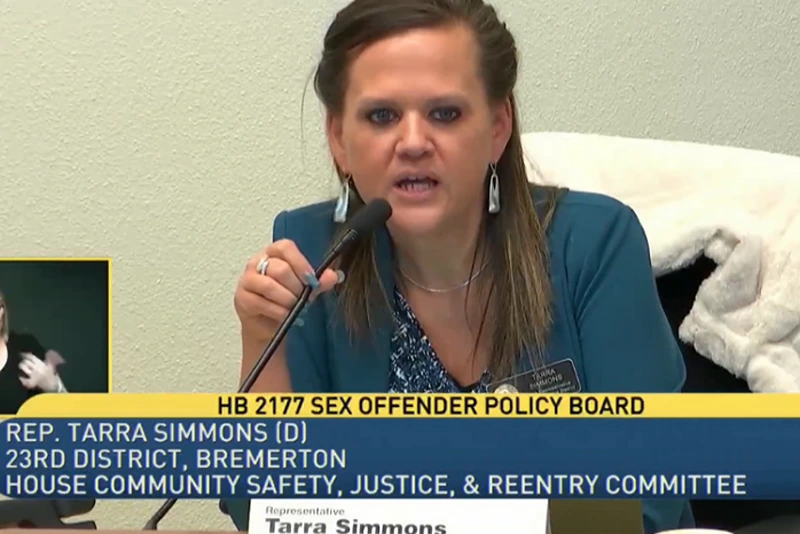

OAN’s Brooke Mallory
5:21 PM – Monday, January 22, 2024
Democrats in Washington gave first priority to a new proposed law that calls for the labeling of violent sex offenders to be based on the “person first” principle. The goal is to destigmatize sex offenders by ceasing to define them in terms of their offense.
Advertisement
HB 2177 would rename the Sex Offender Policy Board (SOPB) as one of the recommended improvements. It will now be known as the Sex Offense Policy Board if it passes. It conveys the shaky idea that the board reviews should concentrate on sexual offenses rather than the offenders who commit them.
HB 2177’s supporters contend that the sex offender’s “lived experiences” are “invaluable,” and as a result, the SOPB will now even shockingly include a convicted sex offender on the board.
Membership is not limited to level 1 sexual offenders or those who are least likely to commit sexual offenses again. The measure permits admission of Level 3 sex offenders, the most dangerous convicts.
Alongside the sexual offender, victims of sex crimes will also be new board members.
The initial goal of the SOPB was to provide sex offender management in order to maintain community safety. However, it has deviated much from its original goal and is now centered on supporting sexual offenders and taking away any feelings of shame for their past revolting actions.
Washington State Representative Tarra Simmons, a Democrat who spent time in jail on three felony charges in 2011 for retail theft and controlled drug possession, is leading the charge on the SOPB legislation. She was also the one responsible for advocating for a sexual offender to be on the board with victims of sexual offenses.
“I think that we all do better when we have a diverse legislature. That’s why I’m here,” Simmons said at a hearing for the bill. “And I’m proud to be here. I think I bring some lived experience that was missing from here. And while some people may have a stigma for people who have committed a sex offense, I think they have invaluable information to share that can really guide this board.”
The head of the SOPB, Brad Meryhew, testified in support of the action.
“And I think it brings to the board, that sort of reality check that we always need in public policy. And I welcome the opportunity to have those voices at the table and to do everything I can to facilitate their active participation in our process,” Meryhew said.
On the other hand, GOP State Representative Dan Griffey expressed disapproval, saying that he could not understand why the board would “advocate” for sexual offenders. Furthermore, he brought up how it is unclear how a victim of any sexual offense would feel about having a convicted sex offender on the board alongside them.
The term “representative with lived experience with incarceration for a sex offense” is the preferred term used to describe a sex offender on the board, according to Simmons. It’s a component of a “person-first” philosophy that extends to the title of the board.
Furthermore, Democrats also attempted to previously standardize the phrase “minor-attracted persons” in favor of “child molester” or “pedophile.”
“This bill incorporates recommendations the board has previously indicated its support, for regarding the use of person-first language,” Whitney Hunt, an advocate of the bill, said. “This change aligns with best practices and research, and encompasses all the individuals involved and impacted by the sex offense management system, including victims.”
Democrats also enacted laws in 2021 that made it easier to release sexually violent offenders on condition across the state. In fact, it motivated predators to pursue Less Restrictive Alternatives (LRAs).
At the time, Senator Christine Rolfes (D-Wash.), the bill’s main sponsor, stated that part of the goal is to reintegrate “people who are potentially dangerous, but not necessarily dangerous, back into communities where they can live safely and with their constitutional liberties protected.” The state now uses person-first terminology when referring to sex offenders on McNeil Island as “residents.”
Traditionally, in order to characterize the disabled and prevent them from being defined by their impairment, “person-first language” has been utilized. It’s about treating individuals with more “respect,” according to the National Institutes of Health.
However, this push towards the acceptance of pedophiles and sexual offenders is not only preached by Democrat representatives. A Psychology Today article from 2022 attempted to manipulate its readers into having more sympathy and understanding for these vile groups.
“If someone runs, you can call them a runner…And if they vote, they’re a voter. Knowing what to call people who do these things is simple. But what if a person is someone who has offended sexually—what do you call them then? Apply the label “sex offender” or “juvenile sex offender” to that person and you define them by a single attribute. You label them based on the worst thing they’ve ever done. The term is accurate but damaging to the future rehabilitation of this individual. The stigma and bias that attach to these and similar terms can follow an individual for their entire life,” the article read, written by Elizabeth Letourneau.
“We live in a world where it’s become commonplace to lob labels like ‘pedo’ and ‘groomer’ at people with whom we disagree,” the article continues.
Politico, a far-left news outlet, even published a story recently on January 9th titled “…Why The Far Right Is Obsessed With Sex Trafficking,” as if sexual assault and exploitation of minors or anybody else is simply an unimportant, irrelevant matter and that only those who are politically “far right” have immense sympathy and concern for these victims of sexual abuse.
Stay informed! Receive breaking news blasts directly to your inbox for free. Subscribe here. https://www.oann.com/alerts






Be the first to comment